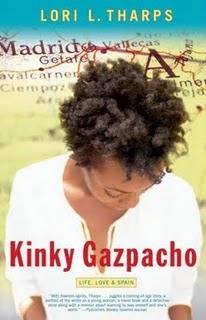Kinky Gazpacho: Love, Life, and Spain

Lori Tharps’ Kinky Gazpacho does what memoirs do best: it brings us the author’s journey through her inner psychological life. The book spans Tharps’ kindergarten “Culture Day” in Milwaukee, Wisconsin through her present life as a freelance writer in Philadelphia. Even as a child Tharps feels “something in Spain is certain to change [her] life,” so when given the opportunity to live in the country through her college’s study abroad program, she takes it.
The book’s subtitle—Love, Life, and Spain—should have also included Blackness, as this is the experiential theme that strings the events discussed in the book together. When she arrives in Spain, Tharps is amazed at the lack of what she terms “political correctness.” She encounters stereotypical images of Africans used to sell products that are supposedly African in origin, like chocolate, or those that are simply dark in color, like soda. In one anecdote, Tharps recounts a group of school children that followed her singing a jingle for a cola she later learned to be visually represented with an African caricature.
Eventually, Tharps loses all political correctness of her own and begins a mission to discover the roots of xenophobia in Spain. She asks Spaniards she meets about the nation’s historical involvement in West African slavery. Despite the overwhelming insistence that Spain took no part in the slave trade, or that only rogue Spaniards were involved, Tharps uncovers a 200 year history of slavery in the country. Her eventual discoveries bring her a sense of peace with her identity as a Black woman in Spain.
While falling out of love with Spain, Tharps falls in love with a Spaniard with whom she begins a romance at the end of her time in the country. The couple must face the challenges of an interracial relationship—such as his grandmother’s refusal to acknowledge her when she visit’s his family’s home and her partner’s shameful admission to having enjoyed dressing up in blackface for festivals as a child—in addition to their physical separation when Tharps returns to the United States at the end of the study abroad program. This reality of this unlikely long-distance relationship is portrayed realistically: the couple breaks up, reunites, tries dating other people, and explores other escape routes created in relationships that privilege rational thought above emotional connection. The couple’s earnest commitment to negotiating their cultural differences through maintaining an ability to laugh at themselves and forgive each other’s flaws allows their relationship to triumph in the end, as the pair eventually gets married.
Tharps is at her best when writing about her emotional experiences. For example, she adroitly expresses her shock at her White high school classmates’ use of racial slurs when describing Black Americans, particularly as it’s done in such a casual, non-threatening manner: _"So," Mrs. Fletcher was saying, "instead of your uniforms you are all supposed to come to school dressed in the clothing of your ancestors. So if your family is German you can wear lederhosen or one of those cute dresses with the white pinafore." This being Milwaukee, the majority of my white classmates claimed German heritage and got it right away…I felt my cheeks burn. If they hadn't been brown, everyone would have noticed that they were red. I tried not to make eye contact with anyone, in case they noticed my discomfort or figured out my shame. My ancestors were slaves! I was the descendant of a group of people kept as chattel, who lived in shacks, worked themselves to death, and, if luck was on their side, fled up north with Harriet Tubman and disappeared. What was I supposed to do? Come to school dressed in rags with a handkerchief tied around my head? And food? Slaves didn't get to eat good food. Maybe my mom could bring in some table scraps for everyone to sample. I could feel my heart beating loudly in my chest and my skin went cold. How was I going to deal with this? And me being the only Black child in my class, my shame was my own. _Her prose falters only when she moves briefly into the realm of critical theory then returns to personal narrative without adequate explanation of how the theory she presents was borne out in her situation.
Kinky Gazpacho was a difficult book for me. I recognized early on that my standpoint was quite distant from Tharps’. I appreciated that she told her story in an intensely personal voice, but my inability to identify with many of her experiences made it challenging to connect with her story.
Cross-posted with Gender Across Borders